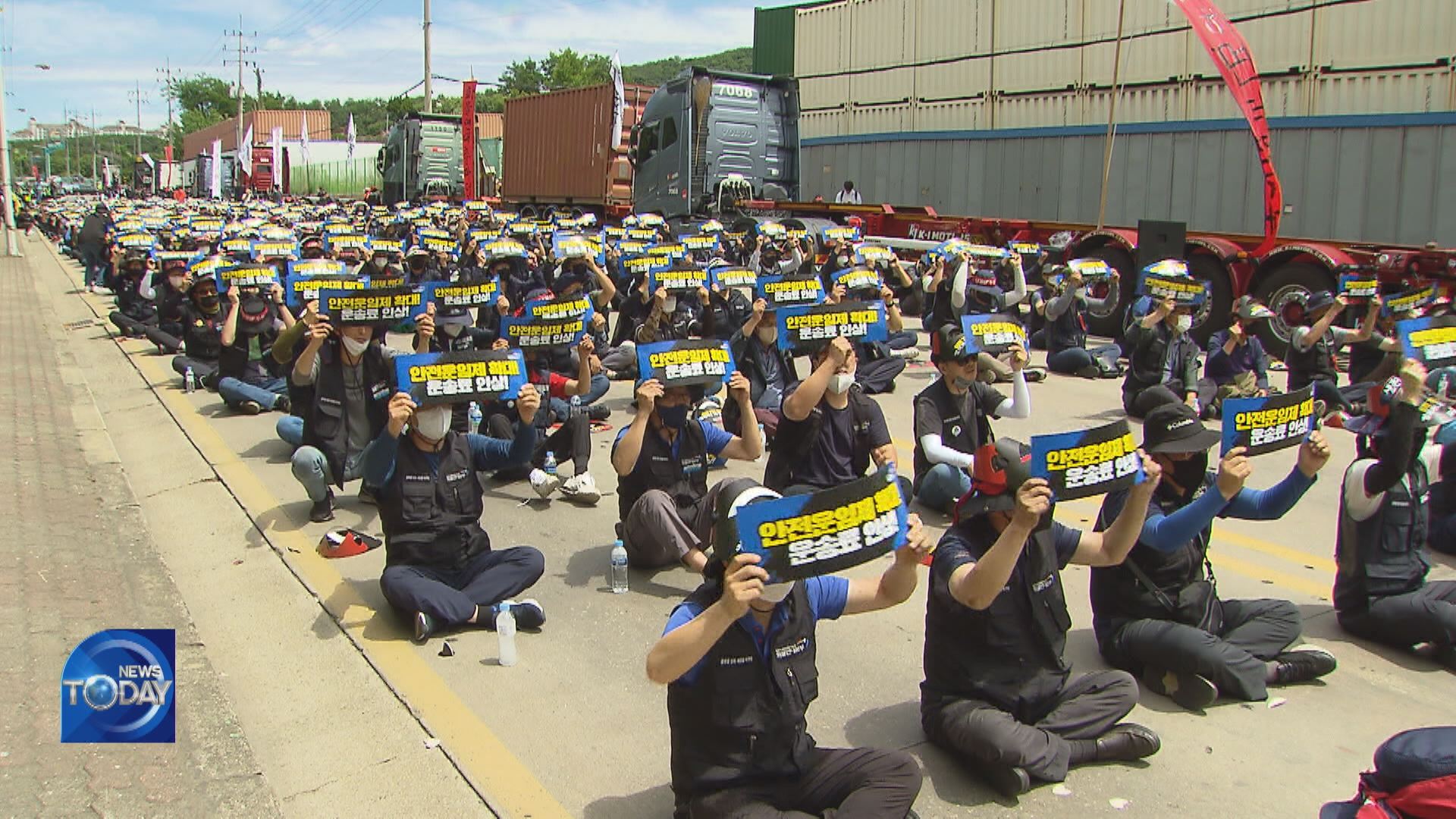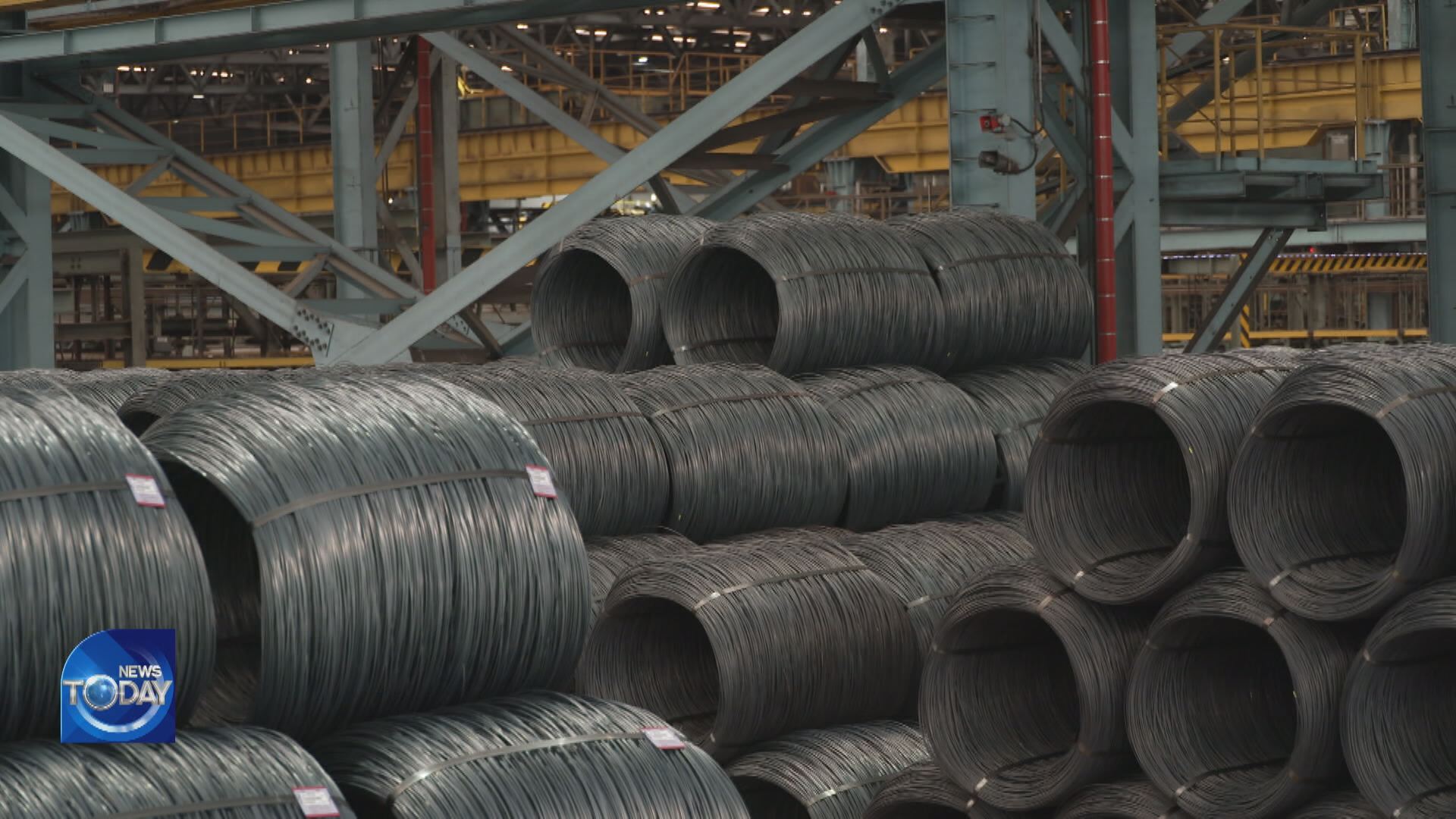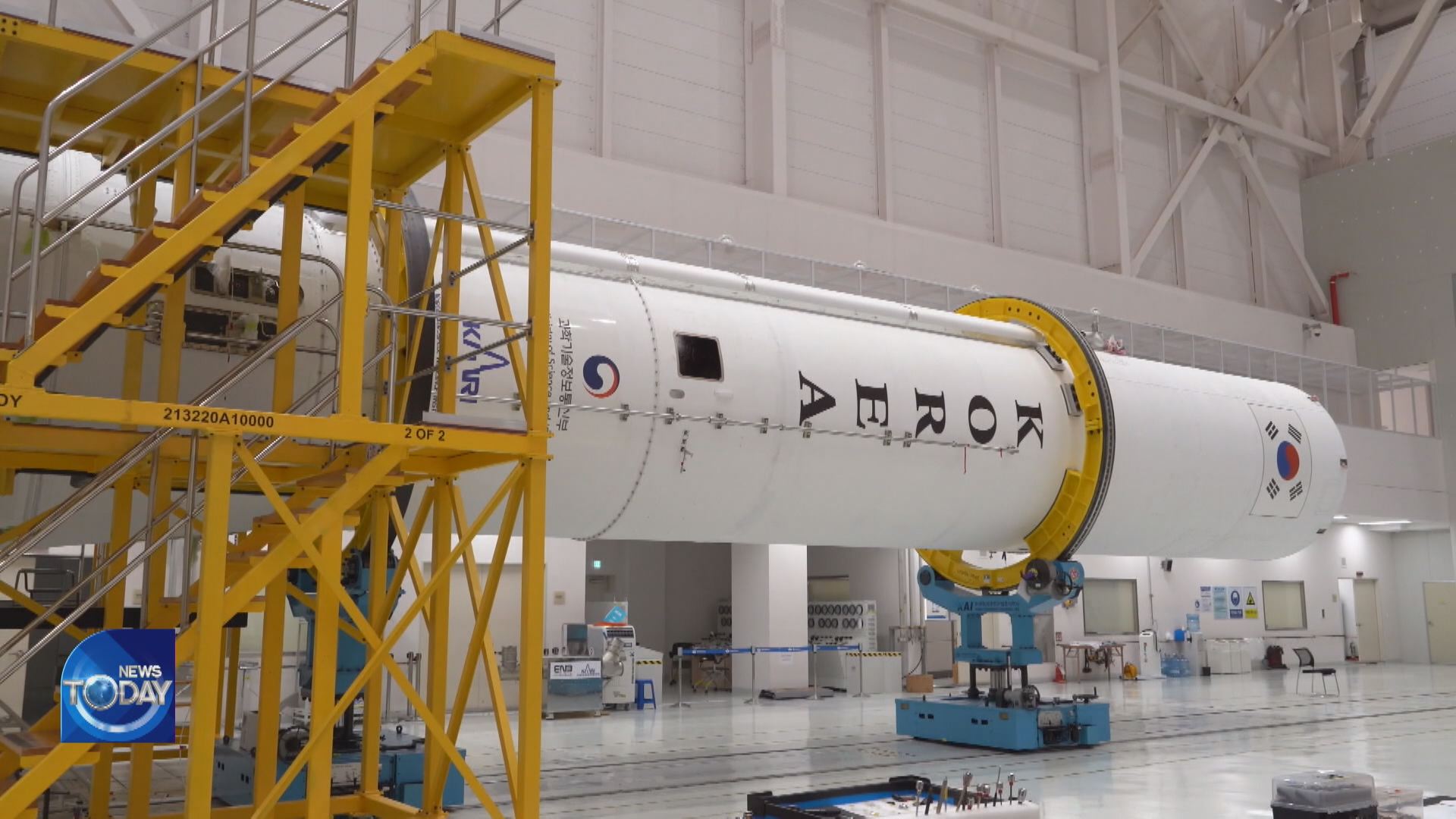DEMANDS BY UNIONIZED TRUCKERS
입력 2022.06.14 (15:14)
수정 2022.06.14 (16:45)
읽어주기 기능은 크롬기반의
브라우저에서만 사용하실 수 있습니다.
[Anchor Lead]
Unionized truckers continue their general strike and demand the extension of the Safe Trucking Freight Rates System saying it's been proven to be effective. They also want the rule to be applied to more types of vehicles.
[Pkg]
Nam Yeong-man drives a cargo truck that is not subject to the Safe Trucking Freight Rates System. He says that with higher fuel costs these days, income has dwindled. Last November, he earned 6.7 million won a month and spent less than 30% of it, some 1.9 million won, at the pumps. But just last month, with skyrocketing oil prices, he spent 2.7 million won on gas... accounting for over 40% of what he had earned. His net income has dropped by 1.5 million won.
[Soundbite] Nam Yeong-man(Cargo Truck Driver) : "Trucks subject to the rule see freight rates go up when fuel costs increase, and minimum living expenses are guaranteed. But other trucks that don't benefit from the rule continuously operate in the red."
The freight rates scheme only applies to vehicles transporting shipping containers and cement, and does not cover some 94% of all cargo trucks. For these 94%, with no minimum guaranteed rate, drivers income is entirely dependent on the transport companies. Commission fees companies take away when they introduce jobs to drivers also lack any standards. Truckers say that as they are connected to shippers through a multilevel structure, they are placed under brutal competition to lower prices.
[Soundbite] Gang Myeong-gil(Cargo Truck Driver) : "One transport firm pays me KRW 0.11 mn out of KRW 0.13 mn it receives from the shipper while another takes 30,000 won for commission. It's a competition for drivers to lower their costs."
A transportation ministry and truck drivers union-led survey shows that since the freight rates system took effect, the number of such transaction stages has decreased. Intermediate commission charges truckers need to pay have also gone down.
[Soundbite] Baek Du-ju(Research group on safe freight rates) : "If a minimum rate for drivers is predetermined, this prevents exploitation in the middle stages, leading to restructuring of firms that only take commission."
The government is reportedly open to discussing the union's demand to continue the rates system. However shippers who own cargo goods argue the rule must be abolished, citing the heavy cost burden.
Unionized truckers continue their general strike and demand the extension of the Safe Trucking Freight Rates System saying it's been proven to be effective. They also want the rule to be applied to more types of vehicles.
[Pkg]
Nam Yeong-man drives a cargo truck that is not subject to the Safe Trucking Freight Rates System. He says that with higher fuel costs these days, income has dwindled. Last November, he earned 6.7 million won a month and spent less than 30% of it, some 1.9 million won, at the pumps. But just last month, with skyrocketing oil prices, he spent 2.7 million won on gas... accounting for over 40% of what he had earned. His net income has dropped by 1.5 million won.
[Soundbite] Nam Yeong-man(Cargo Truck Driver) : "Trucks subject to the rule see freight rates go up when fuel costs increase, and minimum living expenses are guaranteed. But other trucks that don't benefit from the rule continuously operate in the red."
The freight rates scheme only applies to vehicles transporting shipping containers and cement, and does not cover some 94% of all cargo trucks. For these 94%, with no minimum guaranteed rate, drivers income is entirely dependent on the transport companies. Commission fees companies take away when they introduce jobs to drivers also lack any standards. Truckers say that as they are connected to shippers through a multilevel structure, they are placed under brutal competition to lower prices.
[Soundbite] Gang Myeong-gil(Cargo Truck Driver) : "One transport firm pays me KRW 0.11 mn out of KRW 0.13 mn it receives from the shipper while another takes 30,000 won for commission. It's a competition for drivers to lower their costs."
A transportation ministry and truck drivers union-led survey shows that since the freight rates system took effect, the number of such transaction stages has decreased. Intermediate commission charges truckers need to pay have also gone down.
[Soundbite] Baek Du-ju(Research group on safe freight rates) : "If a minimum rate for drivers is predetermined, this prevents exploitation in the middle stages, leading to restructuring of firms that only take commission."
The government is reportedly open to discussing the union's demand to continue the rates system. However shippers who own cargo goods argue the rule must be abolished, citing the heavy cost burden.
■ 제보하기
▷ 카카오톡 : 'KBS제보' 검색, 채널 추가
▷ 전화 : 02-781-1234, 4444
▷ 이메일 : kbs1234@kbs.co.kr
▷ 유튜브, 네이버, 카카오에서도 KBS뉴스를 구독해주세요!
- DEMANDS BY UNIONIZED TRUCKERS
-
- 입력 2022-06-14 15:14:57
- 수정2022-06-14 16:45:06

[Anchor Lead]
Unionized truckers continue their general strike and demand the extension of the Safe Trucking Freight Rates System saying it's been proven to be effective. They also want the rule to be applied to more types of vehicles.
[Pkg]
Nam Yeong-man drives a cargo truck that is not subject to the Safe Trucking Freight Rates System. He says that with higher fuel costs these days, income has dwindled. Last November, he earned 6.7 million won a month and spent less than 30% of it, some 1.9 million won, at the pumps. But just last month, with skyrocketing oil prices, he spent 2.7 million won on gas... accounting for over 40% of what he had earned. His net income has dropped by 1.5 million won.
[Soundbite] Nam Yeong-man(Cargo Truck Driver) : "Trucks subject to the rule see freight rates go up when fuel costs increase, and minimum living expenses are guaranteed. But other trucks that don't benefit from the rule continuously operate in the red."
The freight rates scheme only applies to vehicles transporting shipping containers and cement, and does not cover some 94% of all cargo trucks. For these 94%, with no minimum guaranteed rate, drivers income is entirely dependent on the transport companies. Commission fees companies take away when they introduce jobs to drivers also lack any standards. Truckers say that as they are connected to shippers through a multilevel structure, they are placed under brutal competition to lower prices.
[Soundbite] Gang Myeong-gil(Cargo Truck Driver) : "One transport firm pays me KRW 0.11 mn out of KRW 0.13 mn it receives from the shipper while another takes 30,000 won for commission. It's a competition for drivers to lower their costs."
A transportation ministry and truck drivers union-led survey shows that since the freight rates system took effect, the number of such transaction stages has decreased. Intermediate commission charges truckers need to pay have also gone down.
[Soundbite] Baek Du-ju(Research group on safe freight rates) : "If a minimum rate for drivers is predetermined, this prevents exploitation in the middle stages, leading to restructuring of firms that only take commission."
The government is reportedly open to discussing the union's demand to continue the rates system. However shippers who own cargo goods argue the rule must be abolished, citing the heavy cost burden.
Unionized truckers continue their general strike and demand the extension of the Safe Trucking Freight Rates System saying it's been proven to be effective. They also want the rule to be applied to more types of vehicles.
[Pkg]
Nam Yeong-man drives a cargo truck that is not subject to the Safe Trucking Freight Rates System. He says that with higher fuel costs these days, income has dwindled. Last November, he earned 6.7 million won a month and spent less than 30% of it, some 1.9 million won, at the pumps. But just last month, with skyrocketing oil prices, he spent 2.7 million won on gas... accounting for over 40% of what he had earned. His net income has dropped by 1.5 million won.
[Soundbite] Nam Yeong-man(Cargo Truck Driver) : "Trucks subject to the rule see freight rates go up when fuel costs increase, and minimum living expenses are guaranteed. But other trucks that don't benefit from the rule continuously operate in the red."
The freight rates scheme only applies to vehicles transporting shipping containers and cement, and does not cover some 94% of all cargo trucks. For these 94%, with no minimum guaranteed rate, drivers income is entirely dependent on the transport companies. Commission fees companies take away when they introduce jobs to drivers also lack any standards. Truckers say that as they are connected to shippers through a multilevel structure, they are placed under brutal competition to lower prices.
[Soundbite] Gang Myeong-gil(Cargo Truck Driver) : "One transport firm pays me KRW 0.11 mn out of KRW 0.13 mn it receives from the shipper while another takes 30,000 won for commission. It's a competition for drivers to lower their costs."
A transportation ministry and truck drivers union-led survey shows that since the freight rates system took effect, the number of such transaction stages has decreased. Intermediate commission charges truckers need to pay have also gone down.
[Soundbite] Baek Du-ju(Research group on safe freight rates) : "If a minimum rate for drivers is predetermined, this prevents exploitation in the middle stages, leading to restructuring of firms that only take commission."
The government is reportedly open to discussing the union's demand to continue the rates system. However shippers who own cargo goods argue the rule must be abolished, citing the heavy cost burden.
이 기사가 좋으셨다면
-
좋아요
0
-
응원해요
0
-
후속 원해요
0












![[속보] 심우정 검찰총장 사의 표명…오후 3시 입장 <br>발표](/data/layer/904/2025/07/20250701_1Gcu1S.jpg)
![[속보] 내란 특검, 윤 전 대통령에게 “5일 오전 9시까지 출석” 통지](/data/layer/904/2025/07/20250701_6mdRFo.jpg)

![[영상] 정성호 “검찰 해체 표현 적절치 않아…수사·기소 분리 국민 공감대”](/data/fckeditor/vod/2025/07/01/305901751367182615.png)

이 기사에 대한 의견을 남겨주세요.